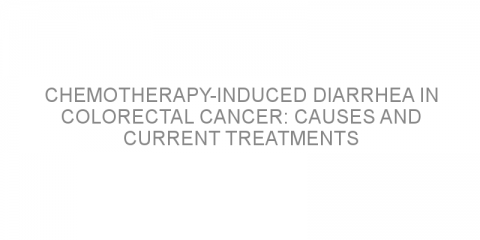In a nutshell The authors examined whether chemotherapy can benefit metastatic colorectal cancer patients (patients whose cancer has spread from the colon or rectum to distant sites) with high ECOG scores. Some background The ECOG scoring system measures how much the cancer is impacting a patient’s daily living abilities (performance...
Read MoreColorectal cancer Posts on Medivizor
Vitamin K1: Help for cetuximab skin rashes in colorectal cancer patients?
In a nutshell This study assessed whether vitamin K1 creams can reduce the risk of skin rashes in patients taking cetuximab (Erbitux) for colorectal cancer. Some background The epidermal growth factor receptor (EGFR) protein is involved in cancer growth. Cetuximab is a treatment that blocks EGFR, slowing cancer growth. It is an effective...
Read MoreComparison of two treatment combinations for colorectal cancer patients not eligible for liver surgery
In a nutshell The authors assessed the safety and efficacy of two treatment combinations for colorectal cancer patients who have liver invasion but who are not eligible for surgery. Some background For patients with colorectal cancer the cancer is most likely to invade the liver if it spreads. Surgery is the best treatment option if the cancer has...
Read MoreLung invasion: what are the outcomes of colorectal cancer patients who have undergone lung surgery?
In a nutshell This study examined cancer relapse rates and treatment options for patients with colorectal lung metastases (colorectal cancer that has spread to the lungs) after curative lung surgery. Some background Roughly 20% of patients with colorectal cancer will have cancer in a distant organ by the time they are diagnosed. The cancer will...
Read MoreFertility rates in patients with Lynch syndrome and young-onset colorectal cancer
In a nutshell This study examined the fertility rates of colorectal cancer patients who have lynch syndrome. Some background Colorectal cancer is a common cancer worldwide. In the United States 143,000 new cases are diagnosed every year. Roughly 4% of these new cases are patients under 45. For these young patients the impact of treatment on...
Read MoreColorectal cancer: can treatment affect female fertility?
In a nutshell This study investigated whether treatment for colorectal cancer (stage II and stage III) can affect female patients’ periods. Some background Stage II/III colorectal cancer indicates that the cancer has spread through the initial layers of the bowel or has invaded the lymph nodes or nearby organs, but has not spread to distant...
Read MoreWho says age matters? Bevacizumab (Avastin) is safe and effective for treating colorectal cancer in patients old and young
In a nutshell This study examined the safety and efficacy of bevacizumab (Avastin) for treating elderly patients with metastatic colorectal cancer (cancer that has spread from the colon or rectum to distant sites). Some background Bevacizumab is an anti-cancer drug that blocks the formation of new blood vessels needed for the cancer to grow and...
Read MoreChemotherapy-induced diarrhea in colorectal cancer: causes and current treatments
In a nutshell The authors discussed the causes of diarrhea and current treatment options for colorectal cancer patients with diarrhea. Some background Colorectal cancer is a very common cancer worldwide. Improvements in screening and medication over the past 20 years have improved diagnosis, patient outcome and survival. However, some of these...
Read MorePositive Thinking and Cancer-Myth-Making
Called the “Emperor of All Maladies.” there’s little doubt that a cancer diagnosis throws life completely out of control. Unfortunately, this chaos creates vulnerabilities that can and have been exploited. It is tempting to believe the idea that if you control your thoughts and make them positive, you can control cancer. However...
Read MoreAdding nimotuzumab: are three treatments better than two for locally advanced rectal cancer?
In a nutshell This study evaluated the safety and efficacy of adding nimotuzumab (TheraCIM, Theraloc) to radiotherapy plus capecitabine (Xeloda; chemotherapy) for locally advanced rectal cancer. Some background Locally advanced rectal cancer indicates that the tumor has spread to the outer layers of the rectum or has invaded the lymph nodes....
Read MorePredicting survival time in colorectal cancer patients treated for lung metastases: what can genes tell us?
In a nutshell This study examined whether genetic mutations (abnormal genes) were linked with shorter survival time in patients with colorectal cancer that has spread to the lungs (lung metastases). Some background Colorectal cancer is one of the most commonly diagnosed cancers worldwide. The cancer will spread to other organs in nearly 50%...
Read MoreComparison of two treatments for colorectal cancer that has spread to the peritoneum
In a nutshell This study compared two treatments for peritoneal metastasis in colorectal cancer (cancer that has spread to the lining of the abdomen). Some background Peritoneal metastasis is a serious complication of colorectal cancer. It is not usually treatable with standard chemotherapy, which is injected into veins or given by...
Read More













